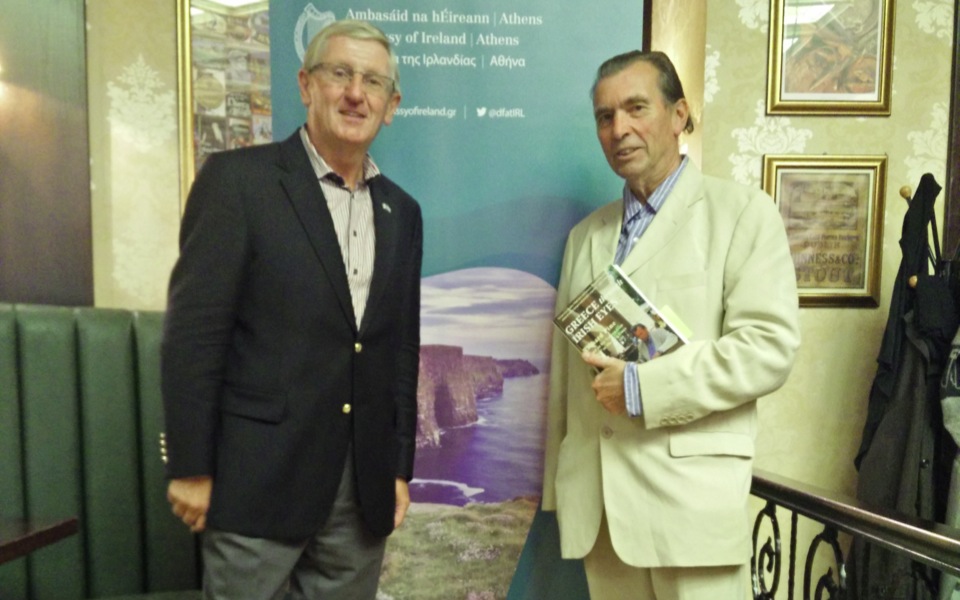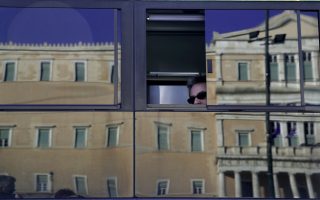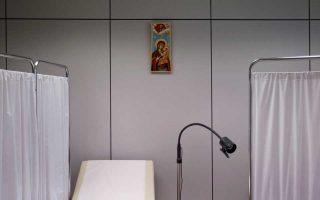The Irishman who loves and mourns Greece

Richard Pine’s passion for Greece is not only deep, it has been a key part of his life almost from the start. “I was predisposed to love Greece because of my education in the classical Greek language,” said the Irish author and theater critic during a presentation of his latest book, “Greece Through Irish Eyes,” in Athens on Wednesday.
Pine, 66, described for a group of journalists at the James Joyce pub in Thiseio his wonder at stepping onto the stage at Ancient Epidaurus during a visit to Greece as a schoolboy. “It was an emotional, humbling moment to find that what one had been studying in school came to life on the stage that had been used by the ancient Greeks,” he said.
In this respect, a subsequent career at the Irish public broadcaster RTE, at the Irish Times and Irish Literary Supplement among others seems to have only been a prelude to the fulfillment of a boyhood dream, which saw Pine move to Greece in 2001 to set up the Durrell School of Corfu on the Ionian island.
Dedicated to improving understanding of the work of Lawrence Durrell and his brother Gerald, the school hosted seminars on literature and the protection of the environment until 2014, when it too became a victim of the Greek crisis.
However, this did not diminish Pine’s passion for his adopted home. In fact, he directed his energy toward using the “Letter from Greece” column that he had been writing for the Irish Times since 2009 into a book.
Irish Ambassador Noel Kilkenny said that the people reading Pine’s column had “learned so much about Greece” over the past six years. “Every Irish person knows about Alexis Tsipras and SYRIZA, and Richard played a significant part in this,” he added.
Pine’s book, though, is not just about the crisis or Greek politics. It is a sweeping look at the many elements that have contributed to make modern Greece what it is today, including history, culture and the arts. Pine also probes at the various complex ideas and ideals that combine to form the concept of “Greekness” (Ellinikotita), which he believes can be broadly defined by five key words that center around “freedom” (eleftheria).
“I am still trying to find what Greece is,” he explained on Wednesday but stressed that many of the problems that have arisen in the country’s dealings with its European partners over the last few years stem from the inability of “non-Greeks to understand what Greekness is.”
“We think of the crisis as what hits our pockets,” he said. “But the crisis is a crossroad between two mind-sets.”
Pine exhibits a visible frustration with many Europeans for failing to take the time to understand Greece. This is especially the case with some of his countrymen, as the author feels that there are “enormous similarities of a psychic kind” between Greece and Ireland.
Pine, though, is not blind to Greece’s deep-rooted problems. He bemoaned the lack of “incentives for success” for young Greeks in their homeland and spoke with real emotion about the teenagers in his village that may have to move abroad in the future. But, as Pine makes clear in his book, Greece’s contradictions and the contrasting emotions it produces are what define the country.
“You don’t love Greece today and mourn it tomorrow,” he said on Wednesday. “You have to do it at the same time.”
Kathimerini English Edition caught up with the author ahead of his book launch in Athens to find out more about what lies behind his latest work.
You cover a wide range of topics in your book, from history and politics to food and literature. Was this a conscious attempt to show your readers that there is more to Greece than feta cheese, as the cliche goes?
The cliche – or any other of the cliches applied to Greece and the Greeks – is so unfair that the only way to remove it was to attempt “Greece entire” – which is equally elusive. But, as I say in the book, it was necessary, especially in the light of the crisis, to “express the very severe – and possibly fatal – condition of Greece, its economy, its administrative system, its geopolitical position, its people, in terms which go beyond the daily grind of austerity and its causes, and provide a portrait of ‘Greece entire’: its adherence to beliefs and behaviors so deeply engrained in the Greek psyche, so radically affected by its ecology, so celebrated and yet so misunderstood. To keep faith with this ‘Greece entire’ became an imperative because it looks for that which is perennial and perduring, which cannot be changed or destroyed. Political crises have sought to affect Greekness, but the Greece I have found and which I describe cannot be affected by mere politics or the vagaries of the marketplace.”
There are 11 million people, almost 200 years of modern history, many different regions and I considered it essential to explain this diversity to the reader who knows little or nothing of Greece, even by means of a superficial description of each area of interest.
In the process of writing the book, apart from seeing Greece through Irish eyes, did you also find yourself looking on Ireland through Greek eyes?
Well, after 15 years in Greece I’m still carrying too much Irish baggage and not yet enough Greek baggage. But yes, the parallels are striking – some on the good side, some on the detrimental side. I’ve had frequently to tell Irish people who are too ready to criticize Greece (and the Greeks) that they should not throw the first stone, given the appalling situation caused by the Irish banking crisis, the corruption in Irish bureaucracy, the Irish names on the “Lagarde list.”
You describe Greece as a country to “both love and mourn.” What is it that you love and mourn most in Greece?
I love the strengths of Greece and I mourn its weaknesses. Strengths in the people themselves, their creativity, industriousness, perseverance, entrepreneurship and – dare I say it – charm. They refuse to be defeated. They demand the right to be wrong.
And the weaknesses, which are bewildering because sometimes they seem to emanate from the same sources: the stifling of that entrepreneurship and dulling the natural energy of its young people, by failing to stimulate it through incentives, and allowing emigration of its best brains; complacency; and of course the cronyism and clientelism which you yourself have identified as stemming from that precious phenomenon of the family and spreading throughout extended families into the wider community of both blood relationships and other bonds/indebtedness in commerce and politics.
Ireland is often held up as an example for Greece to follow: The Irish protested less, their political system was more united and they knuckled down to exit the bailout as soon as possible. What is your view of this narrative?
I would have to argue with you on this: If the Irish protested less, it was to their detriment compared with the Greek protest, and may be due to Irish submission to force majeure; the apparent willingness to submit in particular to the effective mortgaging of every man, woman and child to salvage the banking system; and the capacity to accept the bankrupt nature of modern Irish politics.
Ireland survived and exited the bailout only because it has a far greater capacity than Greece for generating wealth, through the corporate tax haven, the consequent presence of so many multinationals which have made Ireland the European hub, such as Google and PayPal, and the pharmaceutical and computer companies. These, with little indigenous help from the Irish, saved Ireland from even worse decline, and enabled the Irish finance minister [Michael Noonan] to lecture Greece condescendingly.
You spend quite a lot of the book addressing the existential questions that constantly follow Greeks: Who are we? Based on the research you carried out and the range of people you spoke to, do you feel wiser about who the Greeks really are?
I cannot be “wise” or “wiser” because I have looked and I have found only a part. As I say in the book: “One magnificent Greek word which, for me, encapsulates so much of what is attempted by Greece’s voyeurs, is skiagraphy: Technically, it’s a term for the process of x-raying (and also the construction of sundials) but literally it means ‘writing with shadows,’ skia being a shadow. This is what we do, those of us who try to describe Greece, whether we are insiders or visitors: We engage with the shadows that are all Greece is prepared to offer us, and we try to make pictures from the shadows. Maybe we achieve nothing more than a silhouette; maybe our ‘x-ray’ reveals perspectives that might otherwise remain hidden. Who knows?”
I hope – and believe – that I have found some shadows that enable me to love but I know that those same shadows show me the lesions of disease with which we have to live. The important thing is to love and mourn at the same time – not to commute between the two – to live hope, happiness and reality all at the same time.
I don’t think research was of much use, apart from my having read as much as I could in history, politics, sociology and anthropology, as well, of course, as the vast literature in novels and short stories.
Research falls down in the face of experience – watching people at work, at leisure, in arguments, shopping in the markets, drinking coffee, making love – these are real people, living their culture 24/7, and exhibiting it in the gallery of the open streets and plateia (square). This is what helps me to understand Greekness, or at least to appreciate its epiphanies. I am constantly surprised, and a culture that continues to surprise is a vibrant culture, a vibrant people. Diminish the creativity and the elasticity that is within everyone and you diminish Greece.
There is also the issue of belonging and you refer to Constantine Karamanlis declaring that Greece “belongs to the West.” But you arrive at the conclusion that Greece’s future might not lie within the European Union. Why is that? Aren’t you concerned that a Greece outside the EU would be pulled closer to what you describe as the Levant and, therefore, start to regress after years of progress?
I have to take issue with your assumptions about “progress” and “regress.” I am not at all sure that modern Greek history is a narrative of “progress,” except in Western terms of modernization, which inevitably means leaving behind some traditional aspects of Greekness. I’m not so enamored of “the glory that was Greece,” with its slavery, its exposure of newborn infants, its colonizations, which diminish its undoubted world significance in terms of democracy and philosophy. I don’t subscribe to the myth of “Thermopylae” and the 300. But I do mourn the replacement of traditional Greece by aspects of modern “society” that are in my opinion less valuable than what is being jettisoned. It’s a paradox – I bewail the rural depopulation which is taking the young people out of the village, never to return. They are entitled – usually as first-generation college students – to find a better, more rewarding life, but their country owes them the chance to live that life in Greece, not in the USA, Canada, the UK or Australia. I asked a boy in the village who is studying electrical engineering, “How will you vote in the [July] referendum?” His reply was heartbreaking: “My head tells me that I must vote ‘Yes’ so that I can stay in this country when I graduate; my heart tells me that I must vote ‘No’ to save the country, even if it means I can never work here.”
I object to the way the EU has developed from the vision of its founders, into a centrist, determinist, German-dominated financial center, not least because the crisis in Greece, Ireland, Spain and Portugal demonstrated so clearly that the eurozone was ill-conceived and makes the whole EU vulnerable to supranational and supracontinental forces which are joyriding the universe.
I regret that the history lessons of geopolitics and geofinance have not been learned since 1821, that Greece, despite its resistance, seems willing to submit to the realpolitik of Brussels and Berlin. I regret that [Alexis] Tsipras had to kneel at [Angela] Merkel’s feet to achieve the third bailout. I lament the way that [Yanis] Varoufakis – admittedly his own worst enemy – was despicably treated by his peers, simply because he attempted to talk reason and economics instead of platitudes and “Where do I sign?”
I would like to end our conversation with a quotation from the notebooks of Odysseas Elytis [Each one of us is our own Golden Fleece] – a clever appeal to the mythology of the Golden Fleece to illustrate an essential human point? He’s writing of self-discovery and self-worth, and he says, in effect, "Don’t look outside for your true self, for the treasure, it’s within you” – and I believe this applies to all Greeks. And I believe it applies to Greece itself – don’t appeal to the foreigner for help, because the foreigner cannot know the real “you.”





